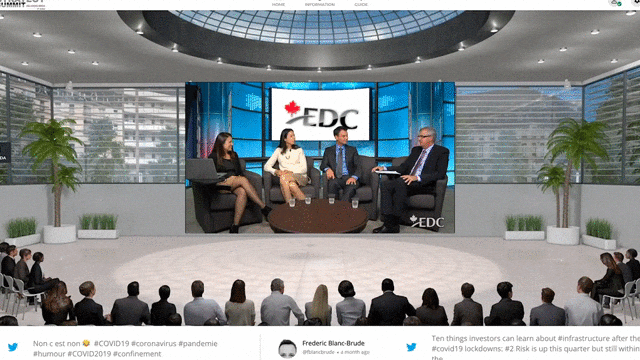Read summarized version with
Organizing an event can be an exciting, rewarding experience but also stressful and overwhelming.
Whether planning a small gathering or a large-scale event, there are countless details to consider and tasks to complete to ensure everything runs smoothly.
From creating a budget, selecting a venue, managing vendors, and coordinating logistics, event planning can be complex and time-consuming.
That’s where an event planning checklist comes in.

A comprehensive event checklist can help you stay organized and focused throughout the planning process, ensuring that nothing falls through the cracks and your event succeeds.
In this blog, we’ll provide you with a detailed event planning checklist that covers all the crucial elements of event planning, so you can easily stay on track and plan a memorable event.
What Does An Event Planning Checklist Include?
A planning checklist is a comprehensive list of tasks and items to ensure that all necessary aspects of an event are planned, executed, and completed successfully.
It is essential to have an event checklist to ensure that everything is taken care of before, during, and after the event.
1. Define Your Event Objectives
Defining event objectives is one of the critical steps in event planning.
The objectives are why the event is being organized and should be the foundation of all other planning activities. The first step in defining your event objectives is determining why you are organizing the event.
The event’s purpose could be to launch a new product, celebrate an achievement, or raise funds for a charity. It is essential to have a clear understanding of the purpose of the event.
The next step is to identify your target audience. The target audience will determine the type of event to organize and the message to convey.
For instance, if the target audience is young adults, the event should be planned around their interests and preferences. The scope of the event should be defined to ensure that the event’s objectives are achievable and need to include the size, location, and type of event to organize.
2. Choose A Date & Venue
Choosing a date and venue is a crucial step in event planning. It sets the tone for the event and affects several aspects of the planning process.
First, choosing a date that works for key stakeholders, such as vendors and attendees, is vital to ensure everyone is available. This will help ensure the event is well attended, and all necessary vendors are available.

Additionally, the data can impact the cost of the event, as prices may vary depending on the time of year or day of the week. Choosing a date outside peak seasons or weekends can reduce costs.
Second, the selected venue is critical to the event’s success. The venue must be able to accommodate the size of the event and should also be accessible for attendees.
It should also fit the event’s overall theme and provide amenities and services, such as parking, technology, and food and beverage services. Choosing a venue that is appropriate for the event and meets the needs of attendees will enhance the overall experience.
3. Setup Engagement Tools
Event engagement tools encourage attendees to participate, interact, and engage with the event content and each other.
3.1. Social Wall
A social wall is a digital display aggregating social media posts from various platforms using a designated hashtag or keyword related to the event.
It is a great event engagement tool as it encourages attendees to participate in the event and share their experiences on social media, which can then be displayed on the social wall for everyone to see.

This creates a sense of community among the attendees and promotes interaction and engagement.
Social walls also provide real-time feedback and insights into what attendees say about the event, which can help organizers make necessary adjustments and improvements.
Additionally, social walls can be customized to match the event’s branding and can be used to display sponsor messages, announcements, or other relevant information.
Overall, social walls are a very effective way to increase attendee engagement and enhance the event experience.
3.2. Live Polls With Leaderboard
Live polls with leaderboards are a great event engagement tool as they encourage attendees to participate in real-time and compete with each other for the highest score.
This creates a fun and competitive environment that motivates attendees to participate actively and engage with the event. Live polls with leaderboards are also an effective way to gather feedback from attendees, as event organizers can design questions relevant to the event’s objectives and goals.
The results can be analyzed to understand attendees’ preferences, opinions, and expectations, which can help organizers to make data-driven decisions.

Live polls with leaderboards are an interactive and engaging event tool that can enhance attendees’ experience and create a lasting impression of the event.
3.3. SnapUp
Taggbox’s SnapUp is a great event engagement tool as it allows attendees to share their content in real-time during the event without login their social media accounts.
This feature allows attendees to capture photos and videos related to the event and upload them directly, which can be displayed on digital screens or projected on a social wall.
This event engagement ideas encourages attendees to share their experiences and engage with the event, as they can see their content displayed in front of a large audience.
It also creates a sense of community among attendees as they can see what others share and connect with like-minded individuals.
Taggbox’s SnapUp also provides event organizers with valuable user-generated content that can be used for future marketing and promotion.
3.4. Live Photo Booths
Live photo booths are a great event engagement tool as they provide a fun and interactive way for attendees to capture and share their event experiences.
These photo booths are typically equipped with high-quality cameras, lighting, and props that allow attendees to take creative photos or GIFs with their friends and colleagues.

Live photo booths are also an effective way to promote brand awareness and marketing, as event organizers can customize the booth with their branding and logos.
Additionally, live photo booths can provide event organizers with valuable user-generated content that can be used for future marketing and promotion.
4. Assemble Your Team
Assembling your event team is a crucial aspect of event planning. A well-organized and skilled team is necessary to ensure that the event runs smoothly and is a success.
The event team should consist of individuals with different skills and expertise to ensure that all aspects of the event are covered.

Determining the skills required for the event is crucial in assembling a team. This could include event planning, marketing, logistics, catering, and technical expertise. If they have not yet joined the business, they must be onboarded quickly. Consider using a tool which can help with the onboarding training and process, ensuring it happens smoothly. It is vital to determine the specific roles required for the event to ensure everyone on the team understands their responsibilities.
Ensuring the team members have the necessary skills, experience, and availability to meet the event’s objectives is vital.
Once the required skills have been identified, the next step is identifying potential team members. This could include colleagues, volunteers, or external contractors.
Lastly, define in a contract who will be responsible for specific tasks, set deadlines, and ensure that everyone on the team understands their role in the event. This way, you would be able to file a lawsuit in a small claims court in case they fail to meet their contractual obligations.
5. Analyze Your Event Budget
Analyzing your event’s financial budget refers to reviewing and assessing the financial resources you have available for a particular event.
This involves creating a detailed breakdown of all the expenses involved in organizing the event, such as venue rental, catering, marketing, staffing, and other associated costs.

By analyzing your event budget, you can identify areas where you can reduce costs or reallocate resources to meet your needs better.
Additionally, analyzing your budget can help you stay within your financial constraints and help you make informed decisions about allocating resources for maximum impact.
Ultimately, carefully analyzing your event budget can help you create a more prosperous and cost-effective event that meets your goals and objectives.
6. Select And Hire Speakers
Choosing a guest speaker is one of the most important decisions you must make when planning an event, and it can frequently mean the difference between success and failure.

If you make the right decision, your event will be the talk of the town. Appropriate speakers will increase the credibility and importance of your event, increase registration numbers, and keep the audience engaged.
An ideal guest speaker will captivate the audience, keep them engaged and entertained throughout the event, educate them, inspire them to make a positive change, present novel ideas, and perspectives, and reinforce the event’s main themes.
Also Read – Top Event Management Companies in USA
7. Work On Event Marketing & Advertising
Businesses need to stand out from the competition more than ever, and event marketing is a great place to start. The customer data you gather from other sources can help you get to know your customers before the event, allowing you to treat them as individuals rather than just another face in the crowd.
Event marketing not only gives you new channels and methods to connect with prospective and recurring customers. According to 73% of event planners, “personalization and data-driven marketing are priorities for events”.

Event marketing should be a crucial component of your demand generation strategy, whether organizing a small webinar, a sizable international trade show, or a private event for senior executives.
Reasons To Create An Event Planning Checklist
Event planning does not have to be a difficult and time-consuming task. Planning an event can be enjoyable and exciting if you know how to make it simple for yourself.
The most important thing you can do to ensure your event is planned correctly is to create an event-planning checklist.
A well-planned checklist will keep you organized, focused, and on track. Here are a few of the main reasons why:
1. It Clears Your Mind
When planning an event, there are numerous factors to consider. You will quickly become overwhelmed if you try to keep your thoughts, ideas, and tasks in your head.
Making a detailed and well-organized checklist will allow you to get everything off your mind and onto paper.
The first step in creating your checklist should be brainstorming and writing down everything that comes to mind.
Once this is completed, you can group and organize your tasks. The ideal checklist lists all of your tasks in order of importance.
2. Keeps Track Of All Of Your Contacts
Tasks involving communication with event contacts should be included on your checklist.
All your contacts will be listed somewhere when your checklist is organized correctly.
You won’t have to look for your contact information or wonder if you’ve reached out to everyone to finalize plans.
Everything will be on your checklist; you can check it off as you complete it.
3. Keeps Track Of Your Finances
Including finances on your checklist is a great way to track how much money you spend when planning your event.
You can create a checklist that includes financial estimates or exact numbers.
When you make a payment, you can mark it as complete by checking it off.
Because everything is listed and organized on a separate accounting sheet, you can quickly transfer all expenses from the checklist to the sheet and your financial reporting software.
Conclusion
This guide will teach you everything you need to know to become an excellent event planner.
It goes over the fundamentals of event planning, how to get your first few clients, how to put together a meaningful event, and many other details you may have yet to consider.
If you refer to this guide as you go, you’ll check the boxes for a successful event.









